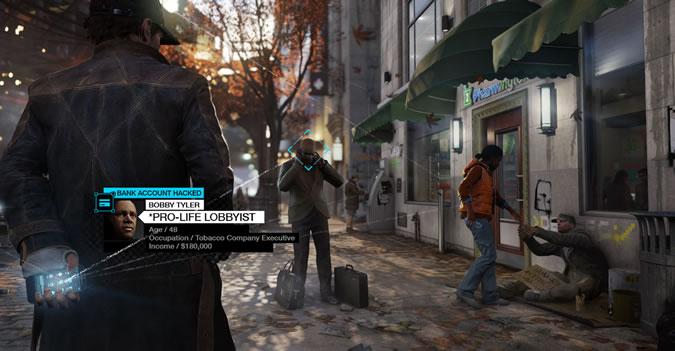Moscow-based Internet security firm Kaspersky Lab said on Wednesday that the developers of the recently relased video game “Watch Dogs,” tapped its experts in order to help ensure scenarios in the game were accurate and to help make the game more authentic.
Released this week by France-based video game maker Ubisoft, Watch Dogs lets players assume the role Aiden Pearce, a brilliant hacker whose criminal past led to a violent family tragedy. On the hunt for those who hurt his family, players can monitor and hack their enemies by manipulating everything connected to the city’s Central Operating System (ctOS) which controls almost every piece of the city’s technology and holds key information on all of the city’s residents.
Players can also access omnipresent security cameras, download personal information to locate targets, control traffic lights and public transportation to stop enemies, and more.
Kaspersky said that its security experts provided technical consultations and recommendations on what they considered was accurate, and what could be tweaked, edited or changed to make the gameplay and plot development more technically authentic.
According to Kaspersky Lab, Ubisoft wanted to “avoid over-sensationalisation or misinterpretation of the cyber-domain”, and to make the theoretical cyber-scenarios in the game, both during in-game play and in character/plot developments, as authentic as possible.
“We knew we had a relevant topic,” Canadian Ubisoft developer Dominic Guay told AFP as the game was previewed at the E3 video game trade show last year. “I turned on CNN, and the first sentence I heard was ‘invasion of privacy,’ switched channels and on Fox they were (talking about) ‘surveillance,’ and I said to my creative director, ‘Those are all our key words.’”
The Watch Dogs development team approached Kaspersky Lab’s security experts at the beginning of 2013, shortly after the Russian security firm released its report on Red October, a sophisticated cyber-espionage campaign that targeted political and business groups throughout the world for more than five years.
According to Kaspersky Lab, by that time, most of the Watch Dogs script had already been completed and the developers were polishing it to make it look more realistic.
“When we first heard about the game we were really intrigued,” said Vitaly Kamluk, Principal Security Researcher with Kaspersky Lab’s Global Research & Analysis Team. “Ubisoft was pretty accurate in terms of predicting upcoming threats and how cities might look like in five or 10 years,” Kamluk said.
“Many of the in-game hacks have become reality already,” he said. “The game conveys well what might happen if control over systems winds up in the wrong hands. You can seize this control yourself and see how it causes difficulties for people all around you. You can take it to extremes to bring chaos to the city. Your actions could even hurt or kill people.”
Many of the hacks in the game are about automated control systems being compromised, a trend that started several years ago with the appearance of the Stuxnet worm.
That was an example of how a computer program can break things in the real world – Stuxnet actually broke physical equipment, and you can have the same thing in Watch Dogs, Kaspersky said.
“Although some of the hacks are very similar to those occurring in the real world, it is still just a simulation – thankfully! It’s crucial to understand that Watch Dogs doesn’t teach you how to hack,” Kamluk said. “What it can do is show you just how powerful a hacking tool can be.”
While Kamluk’s comments suggest that learning hacking techniques from a game could be a negative thing, it’s important to realize that these types of skills could be used for good.
As Wade Williamson explained in a SecurityWeek column, the idea of teaching someone how to hack almost always generates a negative reaction, but that shouldn’t be the case.
“An understanding of hacking no more makes a criminal than an understanding of karate makes someone use the discipline maliciously,” Williamson wrote in his column titled, “Why Teaching Kids to Hack is a Good Thing.“
“Either skill has the potential to be misused for bad things, but likewise, each skill can also make the student better prepared if and when bad things happen,” Williamson added. “However, even more important than simply being prepared for the bad-guys, a hacking methodology is simply one of the best ways to learn about technology.”
“Working with Kaspersky Lab helped us to solidify the technical authenticity in the game,” said Thomas Geffroyd, brand content director, Ubisoft. “There were some liberties we had to take in order to keep the game fun so Vitaly and his team gave us advice within the parameters of including this content in a video game.”
Watch Dogs is available for Sony’s new PlayStation 4 and Microsoft’s Xbox One as well as previous generation consoles PlayStation 3 and Xbox 360.
A promotional trailer of Watch Dogs is embedded below.
